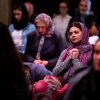Source: “Orthodox Canada”. A Journal of Orthodox Christianity
“If you bless with the spirit, how will he who occupies the place of the uninformed say ‘Amen’ at your giving of thanks, since he does not understand what you say? For you indeed give thanks well, but the other is not edified.” – 1 Corinthians 14:16-17
Years ago, an aging priest from overseas was explaining that only three languages were suitable for Church services: Greek, Latin and Hebrew/Aramaic, since they were the languages written on the sign above the Lord on the Cross. Slavic languages were included by extension, he said, since they used a Greek-inspired alphabet.
“But what about Saint John Maximovitch?”, he was asked. Saint John served the Liturgy in Mandarin Chinese. Concealing his obvious amusement with a crust scowl, the priest replied, “So – what am I supposed to say?!”
The experience of Holy Tradition and mission in the history of Christ’s Church demonstrates to us that Greek or Slavonic are not “better languages” for Liturgical life. They are not even “better” expressions of Orthodox Truth – they are simply the languages that have been used from earlier centuries, since they were universally understandable, and provided languages which could articulate the faith clearly for the salvation of the whole world. Today, this is no longer the case.

Those who would cling to their exclusive use as liturgical languages, or mission languages, or instructional languages, not only lack an understanding of the lives of missionary saints, and of the universal history of the Church, but also must respond to Christ’s great commandment: the commandment of love.
Love has been both the motivation and the method of all missionary saints, who used language of the people among whom they lived. Saint Nicolai of Japan lived in the midst of a tiny Russian community in Japan, but he used Japanese – why? Because the saints always have an outward-looking view, and a long-term view: outward looking for evangelism of the nations, and long-term in terms of preserving in the faith of the children of those already in the Church.
On both these counts, most Orthodox in North America fail miserably:
Multi-lingual countries like USA and Canada see few who would take the Gospel to most language groups: older ethnic jurisdictions protect their language ghetto with almost no mission work to those who are around them. So-called “missionary” jurisdictions focus almost exclusively on mission to white, English speaking middle class people. Both these approaches – at least on a diocesan level – fall short of the path of the missionary saints, since both tend to view one language as supreme – whether Greek, Russian, English, or any other language.
But isn’t it impossible to cater to all sorts of language within a single mission territory? Doesn’t it make sense to approach Orthodox witness with a single unifying language? This is the argument of the Roman Catholics, with the historical use of Latin. It is also the approach of much Orthodox “missionary” work today – whether those who would try to teach Africans to speak Greek, or those who would try to take an English-only approach to missions in North America. The approach of the saints is markedly different. Saint Innocent and the Alaskan mission, finding themselves in a multilingual environment, did not try to impose Slavonic on Alaskan natives, even though many Russians were already filling the churches in Alaska. They could have made the argument that they had many Russian faithful for whom they must care, and welcome those natives who were willing to submit to the Russian environment and the use of the Slavonic liturgical tongue. The could have done this – but they didn’t. The question is, why didn’t they?
The answer is found in the presence of Christian love. Orthodox mission work must be first and foremost based in Christian love – love which is willing to leave behind anything of language or culture which is secondary to the Gospel, which would create a barrier to sharing the Orthodox faith. Saint Nicolai of Japan had such love, as did Saints Cyril and Methodius, and the saints of the Alaskan mission. This is the motive and the sustenance of real mission. Without it, any work of the Church inevitably becomes a club, lacking in love, heaping abuse on factions within it, driving faithful souls out of the parish, and eventually, out of the Church.
There are those who today would make the argument that the use of a language or foreign cultural context provides a protection from the influences of modernism and ecumenism. This is simply not borne out in the experience of the Church. When we look at the greatest culturally adapted missions today – from China to Japan to Alaska – we find the most traditionally minded church communities, overflowing with love, despite their material poverty as local churches. When we look at the most culturally intransigent Orthodox groups – particularly the Greek jurisdictions in the west under the Ecumenical Patriarchate – we find the most vigorous involvement in ecumenism, and the most liberal approach to parish life, despite the greatest material wealth.
History presents us with a number of examples of Orthodox Christians who refused to speak the language of Heaven, cocooning themselves in their cultural and linguistic pride. The Celtic Orthodox in Britain, the Viking Christians of the North Atlantic, certain of the North African Orthodox of the early centuries, and others. What we see after centuries, in each of these cases, is the presence of the Orthodox Church erased, church temples reduced to dust, replaced with the worship of false gods, materialism not least among them. This is the fruit of so-called Orthodox witness that lacks enough love to cross cultural and linguistic barriers.
The language of Christ, and the language of Heaven, is not a language of the earth, nor a language that resulted as the Lord’s punishment from the division of mankind at the Tower of Babel. The language of Heaven is the language of love, the love which shines through the missionary lives of the saints of God, who like Saint Paul, became and still become Gentiles for the sake of the salvation of the Gentiles. Any other approach simply does not match the witness and path of the saints, whether they were intentional missionaries like Saints Paul, Innocent, Nicolai, Cyril, or Methodius, or accidental missionaries, who found themselves in the midst of people in non-Orthodox Christian lands. The language of Heaven, like the Orthodox Faith, is universal: it is the language of love not Greek, not Russian, and not English.
















